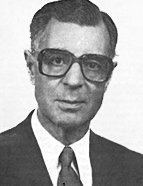

Having been created in 1961, what was called the Portuguese Culture Seminar, which he directed, proposed to guide the 5 th year degree seminar on the theme of Liberalism and the Counter-Revolution. It can be said that this 1964-1965 seminar (preceded by a pre-seminar experience the previous year) constitutes one of his most mark y pedagogical experiences. For the first time, the 19 th century was taught and learned in a methodical way in history courses. This led to the publication, years later, within the framework of the Seminar on Portuguese Culture and the research project on “The History of Ideas in Portugal in the 18 th and 19 th Centuries”, subsidised by the then Instituto de Alta Cultura [ Institute of High Culture ] (IAC), of degree theses on this subject by some students of history, but also of philosophy. In fact, his philosophical background and the fact that the courses he taught on Modern Cultural History and Portuguese Cultural History were not strictly part of a defined course, but were open to students of History, Philosophy and Romance Philology, meant that he also attracted students of Philosophy (and even of literary and linguistic studies), who, alongside graduates in History, were among his first disciples.
Naturally becoming involved in the political and university controversies of the post-25 April period, he was briefly president of the Management Committee of the Faculdade de Letras de Coimbra [School of Arts and Humanities of Coimbra] (1974-1975). Around this time, he founded the Institute of History and Theory of Ideas and coordinated the then newly created Centre for the History of Society and Culture (1976), linked to the Instituto Nacional de Investigação Científica [ National Institute for Scientific Research ] (INIC), which succeeded the IAC. Only then did the chairs of Cultural History and the aforementioned Institute and Centre, which still exist today, now linked to the Foundation for Science and Technology (FCT), move to the History group. In 1977 , he founded the Revista de História das Ideias , which has been published for over 30 years and has dedicated two volumes to him (vols. 8 and 9, 1986 and 1987). In 1979, he was invited to teach at the Universidade Nova de Lisboa [NOVA University Lisbon] , where he was president of the committee that set up the Faculdade de Ciências Sociais e Humanas [School of Social and Human Sciences ] . A new research centre was then created, the Centro de História da Cultura [ Centre for Cultural History ] , with some teachers from Coimbra who accompanied him and joined the teaching staff of the new university, as well as others who joined later. Another journal appeared under his direction, entitled Cultura, História e Filosofia [ Culture, History and Philosophy ] , which also dedicated a volume to him (vol. V, 1986). In this way, Silva Dias created, so to speak, a “school”, which split into two, one in Coimbra and the other in Lisbon.
This work is financed by national funds through FCT - Foundation for Science and Technology, I.P, in the scope of the projects UIDB/04311/2020 and UIDP/04311/2020.
